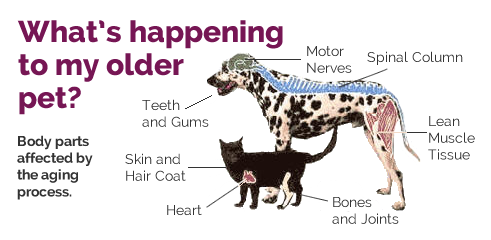Shop At Haya: Your Ultimate Shopping Guide
Discover the best shopping tips, trends, and deals for a smarter buying experience.
Silver Whiskers and Golden Years: Caring for Your Aging Furry Friends
Discover essential tips and heartwarming advice for caring for your aging pets. Give your furry friends the golden years they deserve!
Top 10 Tips for Keeping Your Senior Pets Healthy and Happy
Ensuring your senior pets remain healthy and happy requires a dedicated approach that caters to their unique needs. Here are the top 10 tips to help you achieve this:
- Regular veterinary check-ups: Schedule visits at least twice a year to monitor their health.
- Modified diet: Consult your vet for a senior-specific diet that meets their nutritional requirements.
- Regular exercise: Keep them active with gentle walks or playtime suited to their energy levels.
- Maintain dental health: Brush their teeth regularly and consider professional cleanings.
- Hydration is key: Ensure fresh water is always available to keep them hydrated.
Continuing with our top tips for senior pet care, consider the following:
- Comfortable resting space: Provide a soft, warm bed to ease their joints.
- Monitor weight: Regularly check their weight and adjust their food portions as necessary.
- Encourage mental stimulation: Use toys, puzzles, or training exercises to keep their minds sharp.
- Social interaction: Spend quality time with them and consider group activities or dog parks, if appropriate.
- Watch for changes: Be observant of any shifts in behavior or habits that may indicate health issues.

What to Expect as Your Pet Ages: A Guide for Caregivers
As your pet ages, it's essential to recognize the various changes that may occur in their behavior, health, and needs. Older pets commonly experience decreased energy levels, which means they may prefer shorter walks or more lounging time than they did in their younger years. It’s also not uncommon for aging pets to develop joint issues or arthritis, making mobility more challenging. Regular veterinary check-ups become increasingly important, as these visits will help monitor your pet’s health and catch any potential issues early.
In addition to physical changes, you may notice that your pet's nutritional needs shift as they grow older. Many senior pets benefit from diets specifically formulated for their age group, which often includes fewer calories and higher fiber content. Behavioral changes, such as increased anxiety or changes in sleep patterns, can also arise. Understanding these shifts is crucial for caregivers. Providing a comfortable environment, a routine, and plenty of love will help ensure your aging pet remains a happy and healthy member of your family.
Signs Your Aging Pet May Need Special Attention
As your beloved companion ages, it's essential to be vigilant for signs your aging pet may need special attention. Common indicators include noticeable changes in their mobility, such as difficulty getting up, decreased interest in playtime, or hesitance to climb stairs. If you observe your pet slowing down during their usual walks or struggles with routine tasks, these could be early warning signs of arthritis or other musculoskeletal issues. Additionally, keep an eye out for behavioral changes; if your pet becomes more withdrawn or exhibits unusual aggression, it might be a cry for help due to pain or discomfort.
Another critical sign is alterations in appetite and drinking habits. If your pet suddenly becomes disinterested in food or water, it could indicate dental problems or underlying medical conditions. Weight loss or gain, accompanied by lethargy, should also raise red flags. Regular veterinary check-ups are vital for early detection, but being attentive to these signs your aging pet may need special attention allows you to provide timely support and enrich their golden years. Remember, even small changes can have significant implications for your aging furry friend.